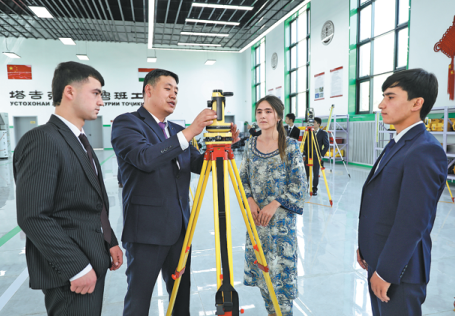
Wu Zhengpeng (second from left), a teacher from Tianjin Urban Construction Management and Vocation Technology College, introduces how to use mapping devices to students at the Luban Workshop in Dushanbe, Tajikistan, on April 12.
When Karakoz Askarbekkyzy hesitated about whether to go to Europe or China for further studies more than 10 years ago, her mother encouraged her to go to China, citing the "promising opportunities" for learning the Chinese language and culture.
Karakoz, a 29-year-old Kazakhstani, embarked on her long journey in the neighboring country and has since developed a strong passion for Chinese culture.
"It was not all smooth sailing at the beginning. When I arrived in China, I found that the biggest challenge was the language barrier because Chinese language was way too hard for me," said Karakoz, who now speaks fluent Mandarin, in an interview with China Daily.
After one year of language learning, Karakoz enrolled at Beijing Language and Culture University in 2013 to study international trade and business. She spent three-and-a-half years at BLCU before being admitted to Beijing Normal University for a master's degree in business in 2017.
During her early days in China, Karakoz participated in numerous cultural tours across the country organized by the university.
"We visited Xi'an, Qufu — the hometown of Confucius — Shanghai and many other fascinating places all over China to experience and immerse ourselves in its ancient yet modern culture," she said. "I am a big fan of Chinese food — I love Kung Pao Chicken, Beijing roast duck, and spinach and peanut salad. ... I even cook some Chinese dishes myself now in Kazakhstan when I missed the Chinese flavors."
Karakoz was also actively engaged in cultural exchange activities on campus. "I really enjoy this kind of activities where I can introduce my culture and civilization to students in China. I also tried my hand at learning Chinese calligraphy and paper-cutting," she said. "Chinese culture and people have always left a strong impression on me."
In recent years, people-to-people exchanges between China and the five Central Asian countries — Kazakhstan, Kyrgyzstan, Tajikistan, Turkmenistan and Uzbekistan — have become increasingly frequent.
Official data show a consistent increase in the number of Central Asian students studying in China, growing from over 11,000 in 2010 to nearly 30,000 in 2018, with an average annual increase of 12.3 percent.
Gao Hanxun, an associate researcher of Central Asian studies at the Chinese Academy of Social Sciences, said that China has become one of the preferred destinations for people in Central Asian countries to study abroad, and studying in China has become a trend among young people in the region.
Under the framework of the Belt and Road Initiative, China and Central Asian countries have strengthened their ties in various aspects, including economic cooperation and people-to-people exchanges, according to Gao.
The BRI was announced in 2013 by President Xi Jinping in Kazakhstan's capital of Astana. Kazakhstan was among the first batch of countries to join the BRI, which involves infrastructure development, trade and investment facilitation, and people-to-people exchanges.
"Youth exchanges have promoted the prosperity of cultures in Central Asia and China, and have also played a significant role in promoting global cultural diversity," Gao said.
According to official data, since 2004, China has established 13 Confucius Institutes and 24 Confucius Classrooms in Central Asia, with over 18,000 students now studying at these learning institutions.
Vocational workshop programs including the famed Luban Workshop are also burgeoning in Tajikistan. Last year, Tajik Technical University, joined by China's Tianjin Urban Construction Management and Vocation Technology College, established a Luban Workshop, making it the first of its kind in Central Asia.
During the Belt and Road Forum for International Cooperation in 2017, Xi highlighted the importance of people-to-people exchanges, saying: "Friendship, which derives from close contact between the people, holds the key to sound state-to-state relations."
Echoing Xi, students from Central Asian countries studying in China find themselves obsessed with Chinese culture, and they gradually develop a deeper understanding of China and Chinese people.
Bekmurzaeva Ainura, an 18-year-old who is now learning Chinese at the University of International Business and Economics in Beijing, said that it was her childhood dream to come to China.
"When I was a little child, I learned a lot of lessons about Chinese culture, which were very interesting. As I grew up, I saw China is now a country of opportunity, so I came here for studies," she said.
Qurbonov Umedjon, a 23-year-old Tajik who studies international trade at the University of International Business and Economics, said that learning Chinese now is very trendy in Tajikistan.
"There are a lot of training institutions for Chinese language in big cities all over Tajikistan and nearly all the Tajik universities have already set up Chinese language courses."
Contact the writers at zhaoruinan@chinadaily.com.cn



